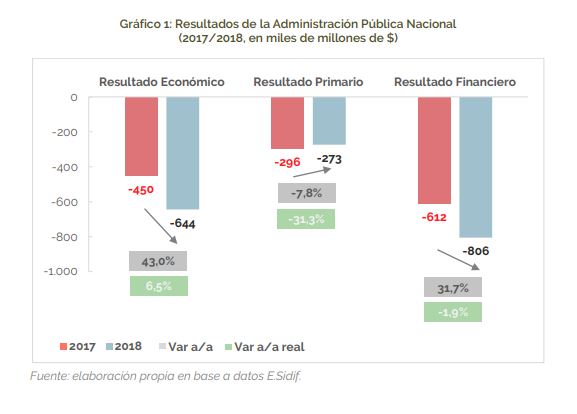
by Nicolas Perez | Jan 23, 2019 | Budget Execution
In 2018, the national government recorded a financial deficit of AR$805.69 billion, equivalent to 5.7% of GDP, and a primary deficit of AR$273.27 billion, 1.9% of GDP.
Both figures are reduced in terms of GDP with respect to the previous year, the financial deficit is down 0.1 percentage points (p.p.) and the primary deficit dropped 0.9 p.p. However, these deficits would have increased to 6.1% and 2.3% of GDP, respectively, if the AR$44.79 billion of works carried out under the Priority Investment Program had been recorded as capital expenditures.
Total revenues fell by 4.1% in real terms and expenditures dropped by 3.5%. This was basically due to a reduction in current expenditure of 2.3% YoY and a contraction in capital expenditure of 20.3% YoY, doubled by the fall in real direct investment.
Within Current Expenditures, the 68.9% YoY increase in Debt Interest -the item that showed the highest real growth- and the 40.9% YoY increase in Economic Subsidies stand out.

by Nicolas Perez | Jan 19, 2019 | Budget Law
Administrative Decision (AD) 12/19 kept the level of total expenditures and revenues, as well as the financial sources and appropriations provided for in the Budget Law 27,467. Of the additional AR$24.2 billion that Congress authorized the Chief of Cabinet of Ministers to allocate, the AD allocated AR$1.8 billion, 7.4% of the total.
From the analysis of the provisions, more restrictions for the hiring of personnel in relation to the 2018 fiscal year emerge.
This AD is an operational instrument to effectively use the appropriations allocated in the Budget Law, detailing expenditures to the maximum possible level.
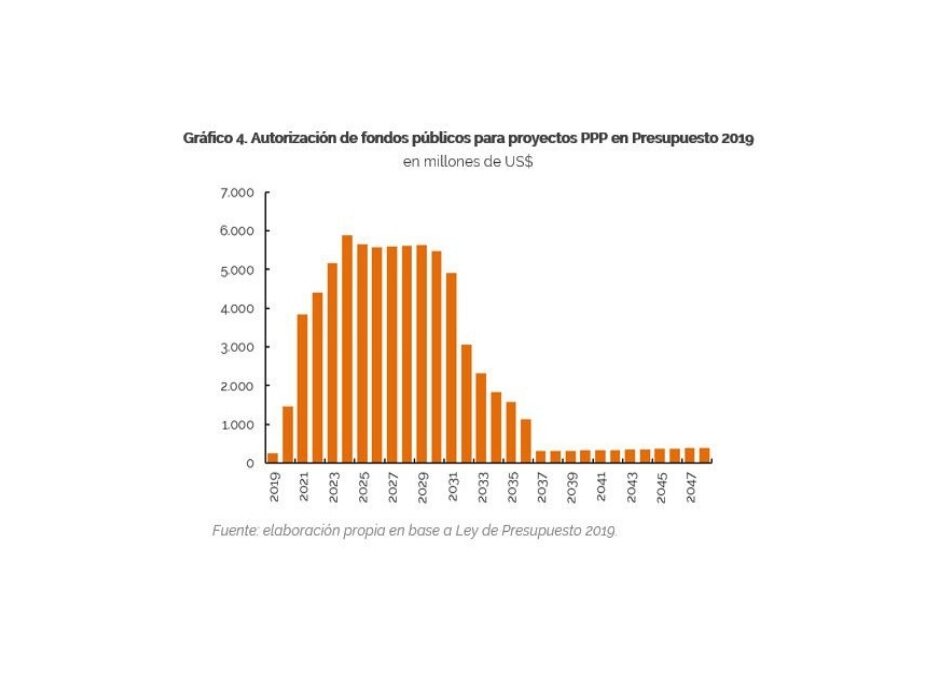
by Nicolas Perez | Dec 28, 2018 | Other Publications
Budget Law 2019 includes eighty projects to be financed through the Public-Private Partnership (PPP) scheme that, if executed, would involve USD73.52 billion of public funds between 2019 and 2048. These projects may generate direct and contingent liabilities for the National Government that will affect the future fiscal performance.
During 2019, the progress of the works is not expected to be recorded as a capital expenditure but as a financial investment (below the line), so it will not have an impact on the balance of the respective fiscal year. Investment Securities (TPI, by its initials in Spanish), issued by the Trusts of each project, are not considered public debt, although they have common features to sovereign bonds and their repayment involves mainly public funds.
Following the best practices in the matter, a methodology for the valuation of contingent liabilities related to PPP projects should be developed, a task on which the Executive Branch is already working.
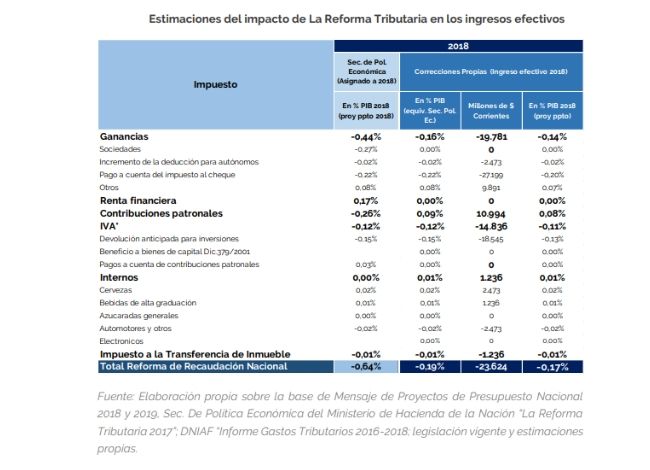
by Nicolas Perez | Dec 27, 2018 | Tax Policy and Fiscal Federalism
The tax reform provided for by Law 27,430 would have a lower effect on tax revenue in 2018 than officially estimated to date due to the delay in the regulation and implementation of the measures adopted within this framework.
At the end of this year, this reform would result in a decrease in tax revenue of nearly AR$23.5 billion, equivalent to 0.2% of GDP, only one third of the 0.6% of GDP estimated by the Secretariat of Economic Policy.
The impact will be greater as the changes are consolidated, but the volatility of the tax system and its sensitivity to macroeconomic situations makes it difficult to give a precise estimate of the future.
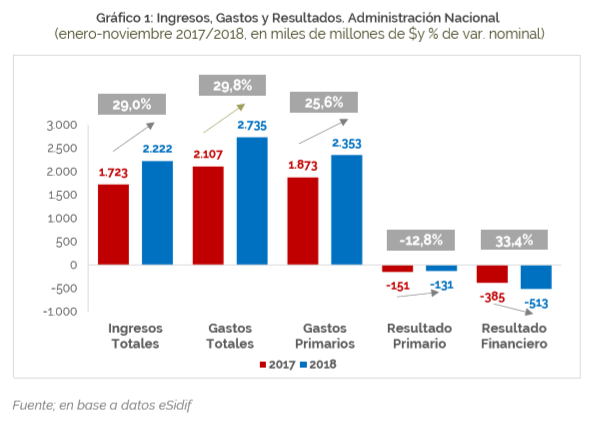
by Nicolas Perez | Dec 18, 2018 | Budget Execution
In November, the National Government primary deficit was AR$ -39.8 billion, 240% higher than in the same month of the previous year, while the financial deficit reached AR$ -55.6 billion, increasing by 70% the negative performance with respect to November 2017.
Total expenditure grew 8.3 percentage points above total revenues, basically boosted by a rise in economic subsidies.
In the cumulative of the first eleven months of the year, the negative primary balance was 34% lower in real terms than that recorded in the same period of the previous year, while the financial balance increased by 0.4%. At the end of November, the initial budget appropriation increased by 20% by virtue of Necessity and Urgency Decrees and Administrative Decisions.
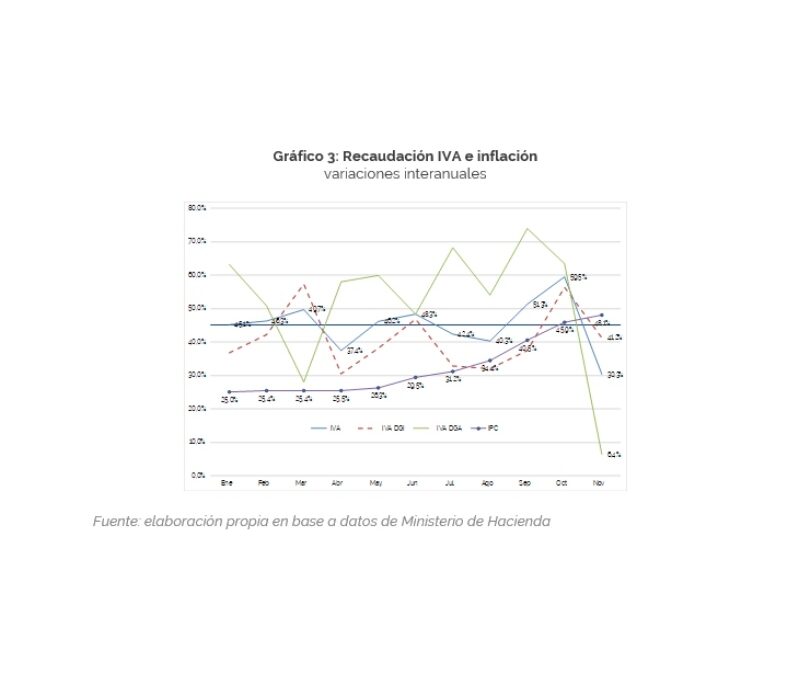
by Nicolas Perez | Dec 13, 2018 | Tax Revenue
National tax revenue fell by 1.6% in real terms as of November 30. Analyzing the closing of the year, we estimate a low probability of reaching the figure included in the introductory statement of the 2019 Budget Bill of AR$3.47 trillion against an 11-month cumulative amount of AR$3.06 trillion.






